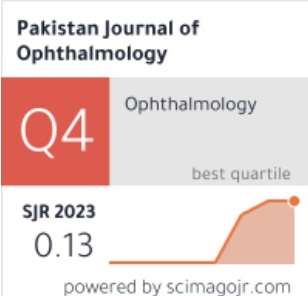Efficacy of Amniotic Membrane after Short Term Storage
DOI:
https://doi.org/10.36351/pjo.v23i01.802Abstract
Purpose: To evaluate the short term viability of amniotic membrane clinically and histopathologically.
Material and Methods: This study was conducted over a period of one year from 1st January to 31st December, 2005 at the Institute of Ophthalmology, King Edward Medical College, Mayo Hospital, Lahore. Amniotic membrane was stored at 4 degrees centigrade in normal saline for 5 days after retrieval and analyzed by a histopathologist before and every day after storage to check for its viability. Amniotic membranes stored in this way were used in 20 patients for various corneal surface disorders and assessed for their clinical efficacy.
Results: Histopathology showed that the basement membrane remained intact for 7 days and the epithelium for 5 days. There were 4 cases of descematocle, 5 cases of corneal ulcers, 2 cases of hypopyon corneal ulcers, one case of perforated corneal melt, 2 cases of bullous keratopathy, one case of chemical burn, 4 cases of pterygia excision and one case of necrosed dermis fat graft. Thirteen cases, including descematocele, corneal ulcers, bullous keratopathy and chemical burn showed improvement of corneal pathology in various ways. Five cases, including pterygia and necrosed dermis fat graft, showed epithelial growth beneath or above the membrane respectively. One case showed failure of the membrane when applied over a perforated corneal melt and another case with hypopyon fungal keratitis failed to show any improvement after amniotic membrane transplantion.
Conclusion: Short term storage of amniotic membrane shows stable clinical and histopathological behavior for the management of corneal surface disorders.






